










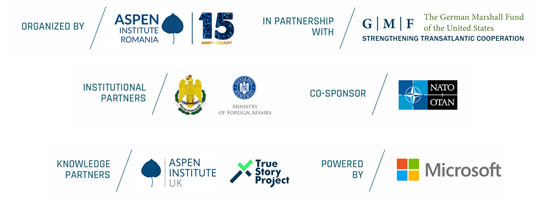
ATLANTIC - BLACK SEA SECURITY FORUM
Democratic Security and Resilience in the Era of Great Power Competition
31 MAY - 2 JUNE, 2021 | BUCHAREST AND ONLINE
FULL VIDEOS OF THE EVENT
The Aspen Institute Romania in cooperation with the Bucharest Office of the German Marshall Fund of the United States will organize the 3rd edition of the Atlantic – Black Sea Security Forum on 31 May – 2 June, 2021, in a hybrid format. The Atlantic – Black Sea Security Forum is a high-level international event dealing with most ardent topics on the international security agenda. This year’s edition will discuss technological advances and their impact on security, with a focus on resilience in the Black Sea-Mediterranean Sea conundrum and beyond.
The decade started on a new reality that encapsulates a transformed definition of security as a global, comprehensive construct. COVID-19 was just one reminder of the global inter-connectedness, and the fact that no one is safe and well until everyone is. Hence, the whole-of-society approaches are dogmatically embedded in every reflex and requirement of the current policies. An increasing sense that security prerequisites must be formulated by grass-roots needs is driving a legitimate claim for improved resilience. Cooperation and competition are reassessed by prescriptions that center on well-being of communities, societies, and environment.
The new reality is a complex of systemic challenges:
Political and social vulnerabilities are deepened by extremism, disinformation, and caveats to confidence building that feature in individualistic foreign policies. Economic tensions accumulate as markets shift, supply and value chains are reassessed, and risks reshuffle as society claims a wider redistribution of profits and interests. Besides traditional risks associated to the sanitary and functioning of health sectors, the pandemic casts uncertainty on effects of mental and physical well-being of our populations on the long-term and generates an open-ended discussion on the prospects of socio-economic recovery. Defense and hard-security are complicated by ever-intricate geo-political shifts, aggravated by persisting use of hybrid tactics and emergence of disruptive technologies.
ATLANTIC - BLACK SEA SECURITY FORUM
Event Agenda
31 MAY - 2 JUNE, 2021 | BUCHAREST AND ONLINE
-
Day 1 31 May
-
Day 2 01 June
-
Day 3 02 June
-
- 9:30 EEST
-
Opening Session
- Florin Pogonaru - Acting President, Aspen Institute Romania
- Alina Inayeh - Director, German Marshall Fund of the United States, Bucharest Office
-
- 10:00 EEST
-
Responding to challenges – NATO and the EU in a post-pandemic world
The COVID-19 pandemics is reshaping the world, both by accelerating trends already in motion, and bringing about new challenges, exacerbating competition, and shaping new attitudes. The world is in accelerated motion, and international organization, NATO, and the EU most importantly, need to adapt to the new realities, and increase the resilience of both their members and the organizations as a whole. Thinking forward while acting now is the main challenge of the two institutions, and setting in motion processes to adapt, act and anticipate has become of paramount importance.- Mircea Geoană, Deputy Secretary General, NATO
- Bogdan Aurescu, Minister of Foreign Affairs, Government of Romania
- Maroš Šefčovič, Vice-President for Inter-institutional Relations and Foresight, European Commission
- MODERATOR: Alina Inayeh, Director, German Marshall Fund of the United States, Bucharest office
-
- 11:00 EEST
-
Coffee Break
-
- 11:45 EEST
-
The Future of Energy Security in the EU and the Region
The nexus between geopolitical interest, security, and a balanced energy mix remains as relevant as always given the current state of international relations. Energy is being used as a political tool by external powers trying to increase their influence in the EU and its neighbourhood. At the same time, the European Green Deal is paving the way for a sustainable, carbon-neutral economy, even though potential tensions between national and European perspectives on energy policy might impede a common approach. The panel discusses energy security from an EU and regional perspective, looking at security of supply (including production of green energy and the use of transitional fuels), security of infrastructure in the context of the digitalization of electric grids, and the role of energy diplomacy in this era of great changes in the sector.- Cristian Bușoi, Chair of Committee on Industry, Research and Energy, European Parliament
- Christina Verchere, Chief Executive Officer, OMV Petrom
- Corina Popescu, Chief Executive Officer, Electrica
- Alessio Menegazzo, Director for Sustainability and Institutional Affairs, ENEL Romania
- MODERATOR: Cristian Pîrvulescu, Director, Aspen Energy & Sustainability Program
-
- 12:45 EEST
-
Lunch break
-
- 13:45 EEST
-
Illiberal tendencies and NATO’s political role
The Alliance is looking at its profile in 2030, designing both its military and political roles in a larger definition of, and approach to, security. It is paramount that illiberal and extremist tendencies are to be looked at as threats to trans-Atlantic values, but also to political and security systems. The expansion of these tendencies, catalyzed by the COVID-19 pandemic, affects individual countries as well as international organizations and their activity. The panel will look at these effects, actions that could counter them, and what the Alliance should/could do in this context.- Dan Neculăescu, Secretary of State, Ministry of Foreign Affairs of Romania
- Ian Lesser, Vice President and Executive Director, German Marshall Fund of the US
- Antonia Colibășanu, Senior Geopolitical Analyst and COO, Geopolitical Futures
- Ivan Vejvoda, Director Europe's Futures project & Permanent Fellow, Institute for Human Sciences, Vienna
- MODERATOR: Radu Tudor, Political and Military Analyst
-
- 14:45 EEST
-
Coffee Break
-
- 15:00 EEST
-
Emerging and Disruptive Technologies and the New Definition of Security
It has become increasingly clear that the definition of security has transformed to denote a global, comprehensive construct. The traditional security paradigm is no longer applicable, as states and international organizations must now increase their resilience in the face of a diverse range of global threats such as cyberattacks, disinformation campaigns, pandemics, and environmental disasters. Emerging and disruptive technologies play a key role in the changing security environment as they represent a cheap and effective tactics for actors trying to destabilize democratic societies. The panel will discuss the latest developments in the field and potential responses at a national and international level.- David van Weel, Assistant Secretary General for Emerging Security Challenges, NATO
- Simona Cojocaru, State Secretary, Ministry of National Defence of Romania
- Jamie Shea, Professor of Strategy and Security, University of Exeter; Former Deputy Assistant Secretary General for Emerging Security Challenges, NATO
- Jarno Limnéll, Professor of Practice, Cybersecurity, Aalto University; Adjunct Professor, Cybersecurity leadership, National Defence University, Finland
- MODERATOR: Kimberly Dozier, Contributor, TIME Magazine; Global Affairs Analyst, CNN
-
- 16:00 EEST
-
Keynote Speech
- Sir Stuart Peach, Chairman of the Military Committee, NATO
-
- 16:15 EEST
-
Military Mobility in the Age of New Security Threats
While transport infrastructure is the backbone of the economy, it has traditionally proven to also play a key role in military confrontations. Military mobility, denoting the unhindered movement of military personnel and assets, thus represents a valuable deterrent. This is particularly important in the case of multilateral Alliances, which must focus on simplifying and standardize cross-border military transport procedures. The panel will focus on military mobility from the perspective of key institutions such as NATO and the EU, while analysing existing challenges in the context of new security threats posed by disruptive technologies and cyberattacks.- Adina Vălean, Commissioner for Transport, European Commission
- Bogdan Cernat, Commander, Joint Analysis & Lessons Learned Centre, NATO Commission
- Ben Hodges, Pershing Chair in Strategic Studies, Center for European Policy Analysis
- Tengiz Pkhaladze, Senior fellow, International Centre for Geopolitical Studies, Former Advisor-Foreign Relations Secretary to the President of Georgia between 2014 – 2018
- MODERATOR: Paul Taylor, Senior Fellow, Friends of Europe, Contributing Editor, POLITICO
- 11:30 EEST
Building resilience in a pandemic and infodemic environment. The struggle for credibility
Particularly in the context of the pandemic, new technologies provide opportunities for the spread of dissenting views and disinformation in order to fragment societies, erode public trust in the state, and undermine democratic institutions and policies. To increase resilience in the face of these challenges and build the credibility of authorities, a whole-of-society-approach is needed, as the public sector must work together with the private sector and civil society. The panel will discuss methods to achieve this.
- Iulia Matei, Secretary of State for European Affairs, Ministry of Foreign Affairs of Romania
- Ivan Krastev, Chairman of the Centre for Liberal Strategies, Sofia; Permanent Fellow, IWM Institute of Human Sciences, Vienna
- Clara Volintiru, Director, Aspen New Economy & Society Program
- Bogdan Lăzăroae, Former Director New NATO Headquarters Project Office and Transition Office
- MODERATOR: Sam Burke, Anchor & Reporter, CNN Affiliate Networks
- 12:30 EEST
New Approaches to Old Problems - a Conversation on the Middle East
- Doru Costea, Ph.D., Ambassador (ret.), Member, Aspen Institute Romania Strategy Group
- Cristina Cileacu, Journalist, Digi24
- 13:00 EEST
Lunch break
- 14:00 EEST
Technology and Maritime Security, from Black Sea to Mediterranean
Maritime trade continues to play a critical role in today’s global economy, hence maritime security and the ability to deter maritime attacks and disruption must remain on the policy agenda of states and international organizations alike. This is particularly challenging when adding new technologies such as AI or anti-access/area denial into the equation. The panel addresses the issues of technology and maritime security in the Black Sea and Mediterranean, regions of critical strategic importance to European security which are currently facing increased militarization.
- Commander Daniil Trică, Deputy for Resources of the Romanian Naval Forces Chief
- Dragoș Tudorache, Chair of Special Committee on Artificial Intelligence in a Digital Age, European Parliament
- MODERATOR: Koert Debeuf, Editor-in-Chief, EUobserver
- 15:00 EEST
Coffee Break
- 16:15 EEST
Multi-stakeholder Coordination at the Intersection of Cybersecurity and Emerging Technologies
Cybersecurity knows no borders and is not limited to any one geography or culture. The challenges and opportunities facing policymakers, cybersecurity experts and the public are global and interdisciplinary in nature and require multi-stakeholder engagement. At the same time, rapid changes and advancements in technology have expanded the threat landscape while directly impacting the societies it serves and the security to protect them. During the early decades of the internet age, there was a race to deploy world-changing technology without always thinking through its security implications. In the age of emerging technologies, we must avoid pitfalls and promote multi-stakeholder inclusion and transatlantic cooperation to not repeat that mistake.
- Dan Cîmpean, General Director, Romanian National Computer Security Incident Response Team CERT-RO
- Sheetal Kumar, Senior Programme Lead, Global Partners Digital
- Rachel Azafrani, Security Strategist, Digital Diplomacy, Microsoft
- Klara Tothova Jordan - Director of Government Affairs and Public Policy, UK, BlackBerry
- Giacomo Persi Paoli, Programme Lead for Security and Technology, United Nations Institute for Disarmament Research
- MODERATOR: Roxana Voicu-Dorobanțu, Associate Professor, Bucharest University of Economic Studies (ASE)
-
- 10:00 EEST
-
Keynote address
- Nicolae Ciucă, Minister of National Defence of Romania
-
- 10:30 EEST
-
Russian assertiveness in South East Europe and the Black Sea region. Version 2021
2021 has been a tense year for relations between the West and Russia. Developments such as the Russian military build-up at the Ukraine border, escalations in the Donbas conflict and the increased militarization of the Black Sea create a particularly challenging context. What does the future hold for the region and what should be a common response from the EU, NATO and partner countries in the region?- Nicolae Ciucă, Minister of National Defence of Romania
- Olha Stefanishyna, Deputy Prime Minister for European and Euro-Atlantic Integration of Ukraine
- Lela Chikovani, First Deputy Minister of Defence of Georgia
- Irakli Beraia, Head of Defence and Security Committee, Parliament of Georgia
- Goran Ilioski, Chief of Policy and Planning Department, Ministry of Defence of the Republic of North Macedonia
- MODERATOR: Andrew Wrobel, Founding Partner, Strategy & Content, Emerging Europe
-
- 11:30 EEST
-
Coffee Break
-
- 12:00 EEST
-
Bitcoin, cryptocurrency, and security - a conversation
- Sebastian Cochinescu, Founder & CEO, TailPath
- Mihai Ivascu, CEO, Modex
- MODERATOR: Sam Burke, Anchor & Reporter, CNN Affiliate Networks
-
- 12:45 EEST
-
Lunch Break
-
- 14:30 EEST
-
The NATO 2030 Initiative – Preparing for the Security Challenges of Tomorrow
The NATO 2030 initiative is a consultation process involving public sector experts, the private sector, civil society and young leaders, seeking ideas to make sure that the Alliance will be able to face tomorrow's challenges. It aims to strengthen collective defense and resilience, while acknowledging that NATO will need to broaden its approach to security, including by addressing the security implications of climate change, maintaining NATO’s technological edge, and protecting democratic institutions. What are critical future priorities and what decisions should be taken at the next Summits in order to make sure that NATO remains the most successful military alliance in history?- Benedetta Berti-Alberti, Head of Policy Planning, NATO
- Thomas Silberhorn, Parliamentary State Secretary to the Federal Minister of Defense, Germany
- Daniel S. Hamilton, Director, Global Europe Program and Austrian Marshall Plan Foundation Distinguished Fellow, Wilson Center
- MODERATOR: Andrew Wrobel, Founding Partner, Strategy & Content, Emerging Europe
ATLANTIC - BLACK SEA SECURITY FORUM
Our Speakers
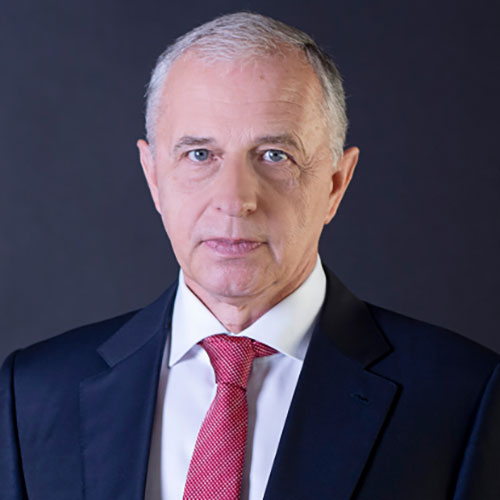
MIRCEA GEOANA
Mr Geoană was born in Romania on 14 July 1958. He studied at the Polytechnic University in Bucharest, the Faculty of Law of the University of Bucharest, the Ecole Nationale d’Administration in Paris, and he holds a PhD from the Economic Studies Academy of Bucharest. Mr Geoană has served as a diplomat and a politician, and in 2009 was his party’s candidate to be President of Romania.
• 1991-1995: Director at the Ministry of Foreign Affairs, Romania
• 1993-1995: Spokesperson of the Ministry of Foreign Affairs
• 1996-2000: Romanian Ambassador to the United States.
• 2000-2004: Minister of Foreign Affairs
• 2001: President in Office of OSCE
• 2004-2016: Senator
• 2004-2008: Chair of the Senate Foreign Policy Committee
• 2005-2010: President of the Social Democratic Party
• 2008-2011: President of the Romanian Senate
• 2012-14: High Representative of the Romanian Government for Strategic Economic Projects and Public Diplomacy
• 2012-2014: Chair of the Parliamentary Committee for Romania’s accession to the Schengen Area
Mr Geoană is a strong advocate of transatlantic integration and has held a number of international positions, including OSCE Chairperson-in-Office in 2001 and personal representative of the OSCE Chairperson-in-Office for Georgia in 2005. He is President and founder of the Aspen Institute Romania and has published extensively on domestic and international affairs. In 2000, he was made a Commander of the National Order, The Star of Romania. He has also been awarded the French Legion d’Honneur and the Italian Stella della Soliedarita.
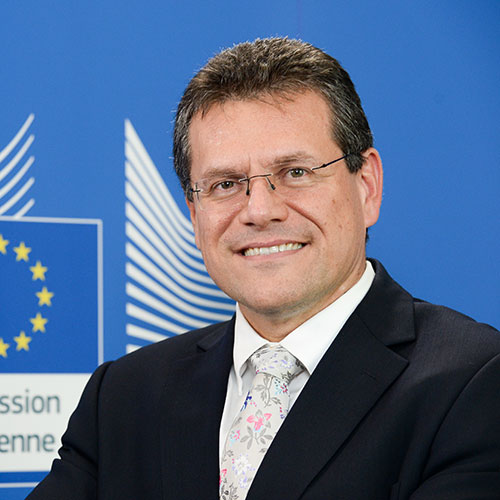
MAROŠ ŠEFČOVIČ
From 2010 – 2014 he was Vice President of the European Commission in charge of Inter-Institutional Relations and Administration. In 2009-2010, he was European Commissioner for Education, Training, Culture and Youth. From 2004 -2009, he was the Permanent Representative of the Slovak Republic to the European Union. As diplomat by profession he served between 1992 and 2004 in Zimbabwe and Canada and as Ambassador to Israel.
He graduated from the University of Economy in Bratislava and the Moscow State Institute for Foreign Relations. He holds a degree as Doctor of Law and a PhD of European Law from the Comenius University, Faculty of Law, Bratislava. He also studied at Stanford University, USA.
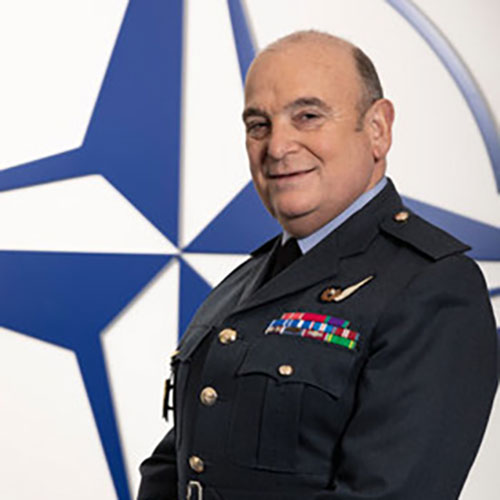
SIR STUART PEACH
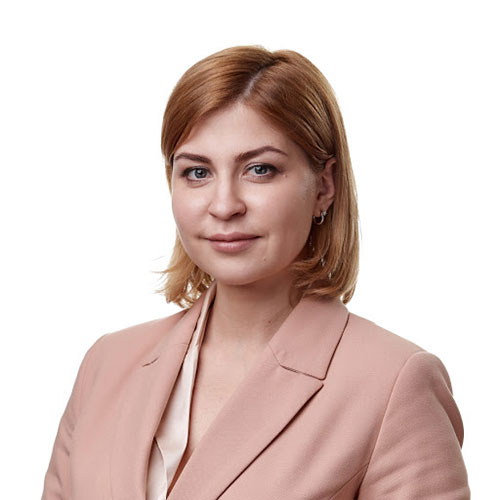
OLHA STEFANISHYNA
In 2008, graduated from the Faculty of International Law of the Institute of International Relations of Taras Shevchenko National University of Kyiv. Specialization: international law and translation.
In 2016, obtained a specialization in Finance and Credit from Odessa National University of Economics.
Short-term scholarships at the Diplomatic Academy of Vienna and at the Estonian School of Diplomacy.
Work Experience:
In 2007-2010 – private legal practice
In 2010-2015 - worked in the Department of International Law / Department of European Integration at the Ministry of Justice of Ukraine.
In 2017-2019 – Director (later Director-General) of the Government Office for Coordination of European and Euro-Atlantic Integration at the Secretariat of the Cabinet of Ministers of Ukraine.
In 2020 – private legal practice
On June 4, 2020, was appointed as Deputy Prime Minister for European and Euro-Atlantic Integration of Ukraine.
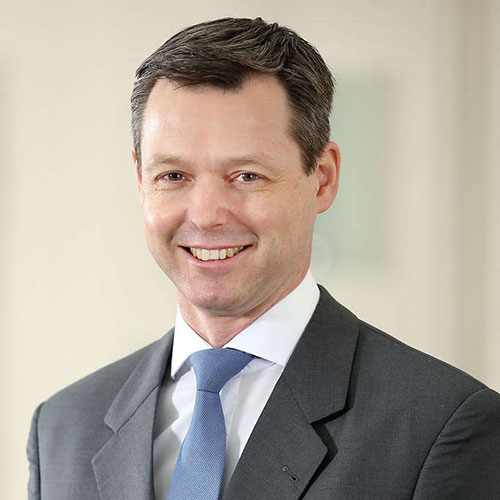
THOMAS SILBERHORN
At the Federal Ministry of Defence, his responsibilities include equipment and international armaments policy as well as military planning, budgetary affairs and the real estate management of the Bundeswehr.
Thomas Silberhorn is a lawyer. After his second state examination, he worked as a research assistant at the University of Bayreuth from 1994. In 2001, he took up work as a lawyer in Munich and Berlin.
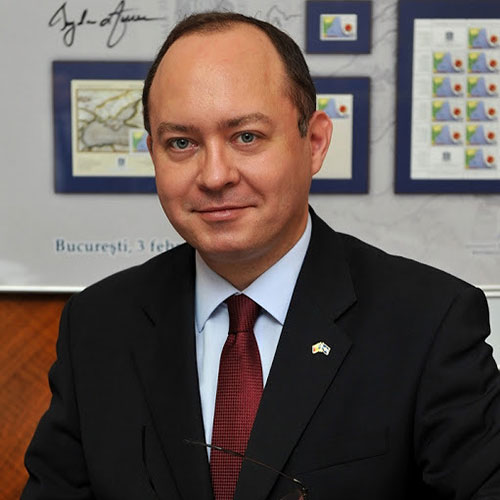
BOGDAN AURESCU
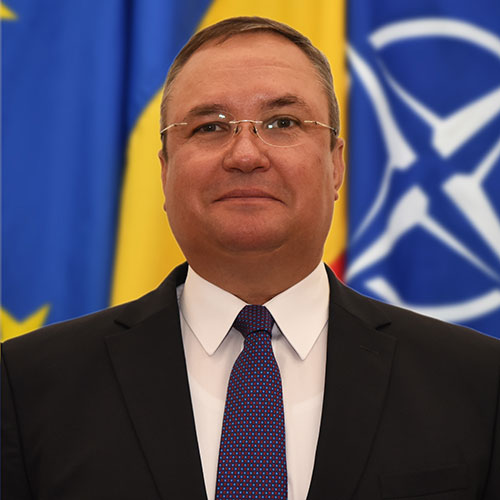
NICOLAE-IONEL CIUCĂ
Land Forces Academy in 1988. His education and training were closely connected to his appointments as he subsequently achieved various positions from platoon leader up to battalion and brigade commander in 2011. During this period, he participated in different operations and missions, both national and international, such as: UNAVEM III Angola in 1996 as staff officer, Enduring Freedom Afghanistan (2002-2003) and Antica Babilonia Iraq (2004) as Battalion Commander.
From 1993 to 1995, he graduated from the National Defense University in Bucharest, and in 2003 he achieved a PhD in Military Science.
In 2011 he was appointed Commander of the 2nd Infantry Division, and, three years later in January 2014 he took over the command of the Romanian Land Forces Staff. In October 2014 he was appointed Deputy Chief of Defense Staff. Since January 2015 until October 2019 he successfully accomplished the most demanding position within the Romanian Armed Forces, Chief of Defense Staff.
During his entire career, Minister Ciuca attended various courses, the most relevant ones being: Instructor for Peacekeeping operations Course in Turkey, Joint and multinational operations Course, Civil-Military Cooperation in Eastern Europe and Central Asia Course, Florida/USA, US War College in 2006.
Besides his education and training, he took part in many exercises, national and multinational: Blue Danube 2000, Dynamic Response Kosovo, ISAF 2003, and Eurasian Star 2010 in Turkey.
He was awarded The National Order for Merit in the rank of Officer, The National Order for Merit in the rank of Knight, UN Medal for participating in UNAVEM III Mission, The National Order for Merit of the French Republic, in the rank of Commandor, The US Medal of Merit, The Medal of Honor of the Special Operation Forces of the USA.
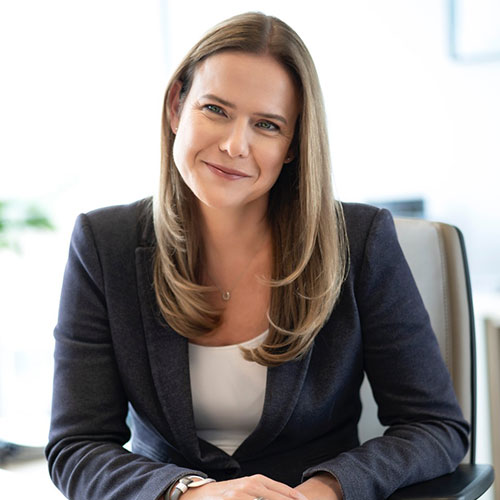
CHRISTINA VERCHERE

KIMBERLY DOZIER
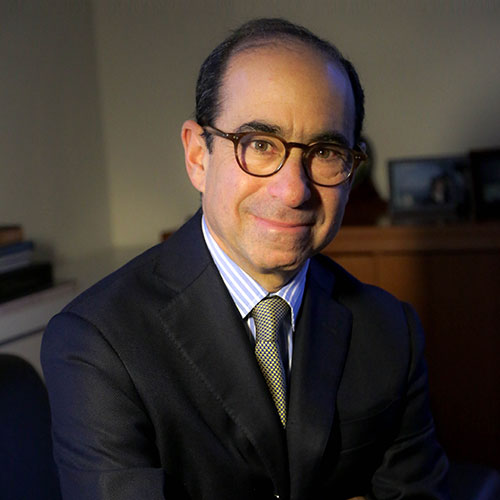
IAN
LESSER
Prior to joining GMF, Dr. Lesser was a public policy scholar at the Woodrow Wilson International Center for Scholars, and vice president and director of studies at the Pacific Council on International Policy. He came to the Pacific Council from the RAND Corporation, where he spent over a decade as a senior analyst and research manager specializing in strategic studies. From 1994-95, he was a member of the Secretary’s Policy Planning Staff at the U.S. Department of State, responsible for Turkey, Southern Europe, North Africa, and the multilateral track of the Middle East peace process.
A frequent commentator for international media, he has written extensively on foreign and security policy issues. Dr. Lesser was educated at the University of Pennsylvania, the London School of Economics, and the Fletcher School of Law and Diplomacy, and received his doctorate from Oxford University. He is a member of the Council on Foreign Relations, the International Institute for Strategic Studies, and the Pacific Council on International Policy. He serves on the advisory boards of the Delphi Economic Forum, Atlantic Dialogues, the NATO Defense College Foundation, and Turkish Policy Quarterly, and has been a senior fellow of the Onassis Foundation in Athens and the Luso-American Foundation in Lisbon.
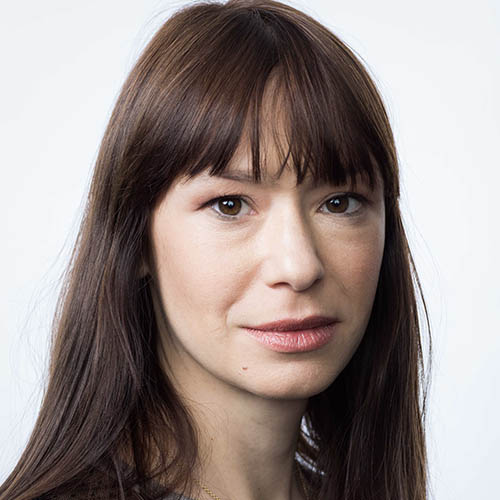
BENEDETTA BERTI-ALBERTI
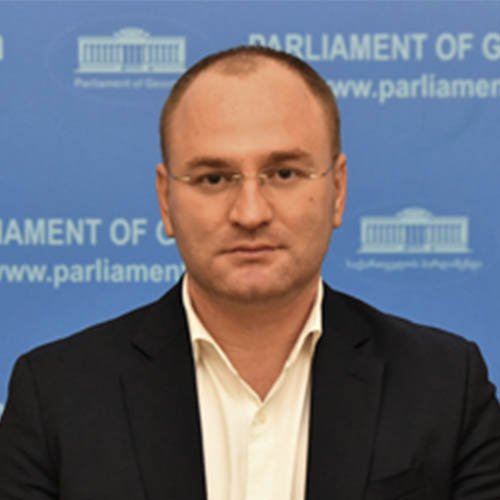
IRAKLI BERAIA
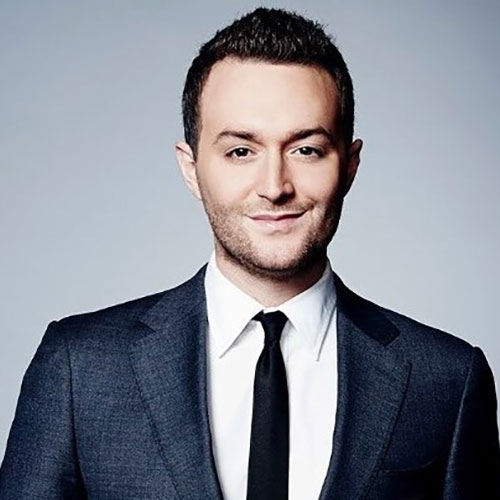
SAMUEL BURKE
Currently, he’s developing a TV series and authoring a book on how two unexpected DNA test results shook his family to the core.
Burke has reported from the scene of major world events such as the Manchester Ariana Grande concert bombing, the Grenfell Tower residential fire, as well as the UK parliament and London Bridge terrorist attacks.
He’s hosted the “iReport” program at CNN International and for nearly a decade anchored CNN en español’s “Cibercafé” for the network’s flagship morning program.
Burke covers major international technology events and has interviewed the heads of the world’s largest companies like Twitter CEO Jack Dorsey, Microsoft CEO Satya Nadella, Alibaba CEO Jack Ma, Tinder Founder Sean Rad, Ford CEO James Hackett, T-Mobile CEO John Legere, former Intel CEO Brian Krzanich, former Ford CEO Mark Fields, Under Armour CEO Kevin Plank, TransferWise CEO Taavet Hinrikus as well as heads of state such as Israeli Prime Ministers Ehud Barak and Ehud Olmert, as well as Chilean President Michelle Bachelet.
He started his CNN career as an intern for Anderson Cooper and then served as Christiane Amanpour’s digital and field producer. Alongside Amanpour, he traveled across the Middle East producing reports and live broadcasts from Egypt during the country’s first-ever democratic elections, Israel and the Palestinian territories. Before joining CNN, Burke was a freelance producer for Phoenix’s NPR affiliate KJZZ and ABC News’ 20/20 program.
Burke studied Spanish linguistics at La Universidad Autónoma de Guadalajara in Mexico and graduated summa cum laude from the Barrett Honors College at Arizona State University. He received his master’s degree in journalism from The Walter Cronkite School of Journalism and now serves on the Cronkite School National Board of Advisors.
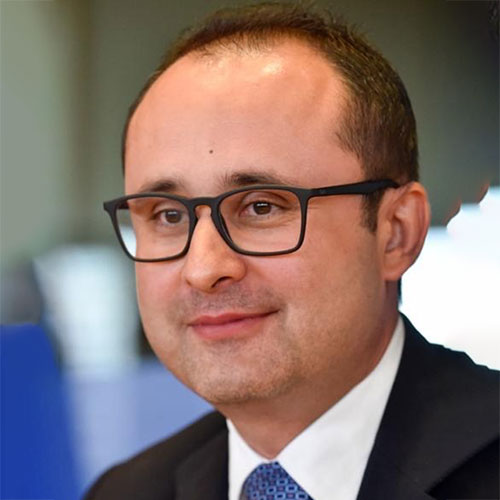
CRISTIAN BUȘOI
Mr. Busoi graduated Medicine from Carol Davila University in Bucharest, Law from Titu Maiorescu University in Bucharest, and Diplomacy from the Romanian Diplomatic Institute in Bucharest. His political career started in 1996 when, as a student, he became member of the National Liberal Party. Eight years later, he entered the Romanian Parliament and, in 2013, became President of the Romanian National Health Insurance House. Since 2007, he has been elected to the European Parliament for three consecutive terms.
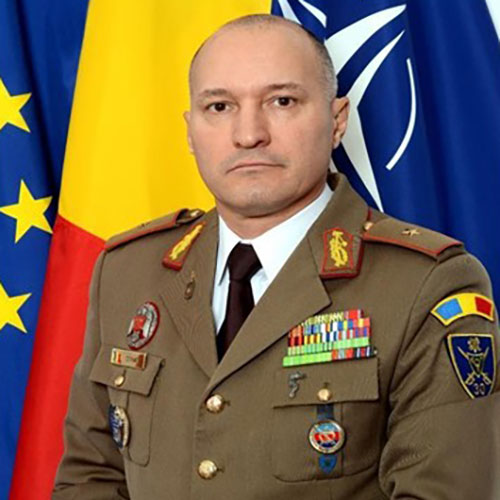
BOGDAN CERNAT
Between June 1994 and November 2000, he served as platoon and company commander in the 30th Guards Regiment. Between July 2002 and June 2007 he returned as battalion commander in the same regiment.
In June 2007, BGEN Cernat took his first staff assignment as chief Future Logistic Ops in the Joint Logistics Command and continued as chief of Protocol Office of the national Ministry of Defence, coordinating protocol activities involving representatives at the political-military level and ensuring implementation of relevant international protocol requirements.
Between February 2009 and May 2014, he was assigned within the General Staff as Chief of Military Police Division. In this role, he directly advised his Chief of Defence on the relevant aspects of: homeland force employment as well as employment in theatres of operations; policy development; and contribution to and implementation of relevant international standards.
Later, within the national Military Police, he led the analysis in support of the capability development and training of the military police forces which contributed to the implementation and improvement of these forces. Further, BGEN Cernat also initiated and implemented the national Lessons Learned structure and process within his division and supported its wider implementation across the military police forces.
During his career, BGEN Cernat continued his education, including: The International Military Observer and Staff Officer Course, United Nations Training School, Ireland; Defense and Operational Planning Course, the Netherlands Defense College; Exercise Planning and the Law of Armed Conflict Course, Turkey; Command and Staff College for Land Forces, Romanian National Defence University. He also holds a Master in national defence and security from the Romanian National Defence University and a bachelor’s degree in marketing from University of Economic Studies in Bucharest. Finally, he is a 2013 graduate of the US Army War College, in Carlisle, Pennsylvania, the United States.
In May 2014, BGEN Cernat was assigned as the commander of 30th Guards Brigade, ensuring, among others: development of human capital; the high readiness combat status; force protection for strategic military installations; military ceremonies—particularly those involving the Romanian President; design, development, and implementation of specific Lessons Learned procedures necessary to capture all experiences leading to organizational improvements.
Throughout his career, BGEN Cernat has received several awards and medals, granted by various entities, including at the presidential level.
He is married and has a daughter.
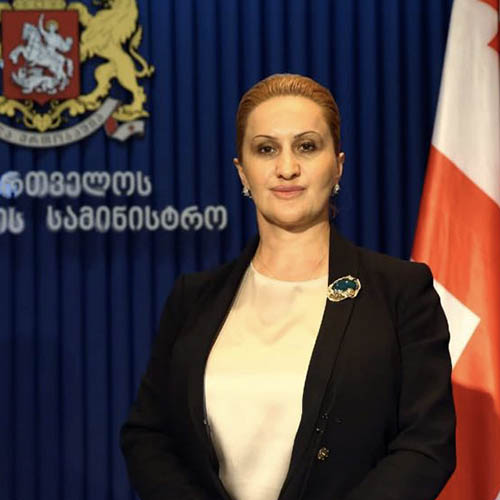
LELA
CHIKOVANI
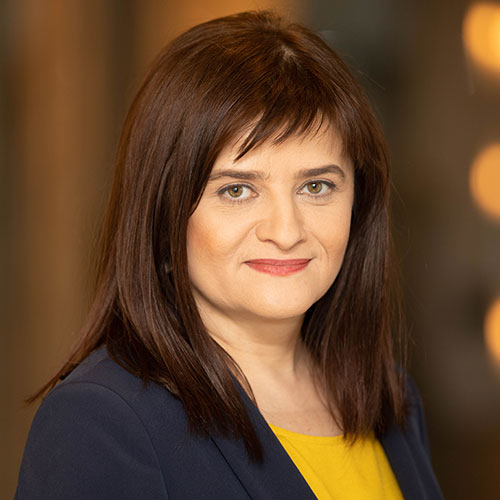
CRISTINA CILEACU
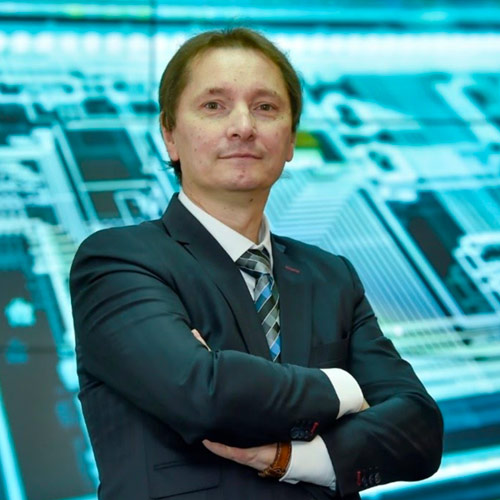
DAN
CÎMPEAN
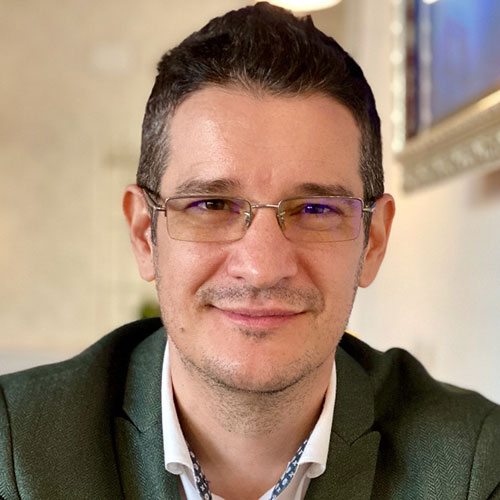
SEBASTIAN COCHINESCU
He has more than 20 years of business executive-level experience working with Apple, Hubert Burda Media and Avandor. In 2018 he was awarded with the Honor Emblem of the Romanian Army High Command.
He also graduated the Executive Management Program – Blockchain Academy at the University of California, Berkeley, School of Law.
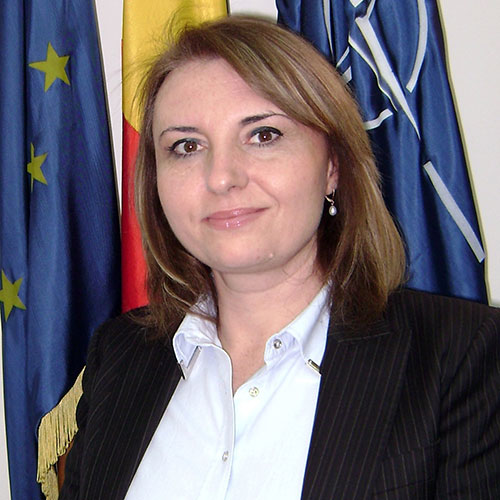
SIMONA COJOCARU
Previously she held a series of very important positions as Director of the Defense Policy Directorate from 2013-2015 and 2017-2019, and Director of the Cabinet of the Minister of National Defense, between 2015-2016. She has been awarded the Order of Merit in rank of Knight (2016), The Merit Emblem "In the service of the Romanian Armed Forces", 3rd class (2014) and the "Honor of the Romanian Military" emblem (2014).
Simona Cojocaru holds a degree in economics, graduating the Faculty of International Economic Relations within the Academy of Economic Studies in Bucharest, and a master's degree in International Relations and European Integration at the National School of Political and Administrative Studies, Bucharest. She has completed multiple courses of international relations training at renowned schools abroad, such as the High Level Course at the European Security and Defense College, JFK Government School - "Senior Executives in International Security" Program, Royal Military College, Shrivenham, UK - "European Security"; France - "Personalité d'avenir défense" program, organized by the French Ministry of Defense; USA - "Challenges of US foreign policy. European Regional Project" - International Visitor Leadership Program, organized by the US State Department.
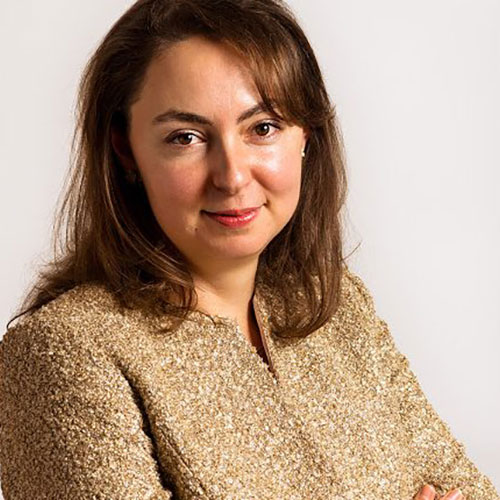
ANTONIA COLIBASANU
In february 2020, Antonia joined the teaching staff of the National University for Political Studies and Public Administration, as a full time lecturer on geopolitics, geoeconomics and economic diplomacy.
Since 2016 she is also leading the Active Compete+ (AC+) group of Ferinvest Technik + Service SRL, a company based in Romania and actively trading and advising international businesses in Europe for the last 25 years. Her team offers advisory services on geopolitics and international development strategy.
She works closely with bestselling authors George Friedman and Robert D. Kaplan and served as Honorary Adviser to Romania’s Minister of Energy.
She is a trainer on geopolitics for European Affairs program at the Romanian European Institute. Dr. Colibasanu has also worked and developped various courses and educational programs with the Academy of Economic Studies, Bucharest. She frequently speaks on international economics and security topics at conferences and events in Europe, and since 2012, she has served on the educational board of the International Academy of Advanced Studies in Greece, a summer program that brings together students from Eurasia and the Middle East.
Prior to joining Stratfor in 2006, Dr. Colibasanu held a variety of roles with the World Trade Center Association in Bucharest. Among other academic credentials, she holds a doctorate in international business and economics from Bucharest’s Academy of Economic Studies, where her thesis focused on country risk analysis and investment decision-making processes within transnational companies. She also holds a master’s degree in international project management. She is an alumna of the International Institute on Politics and Economics, Georgetown University.
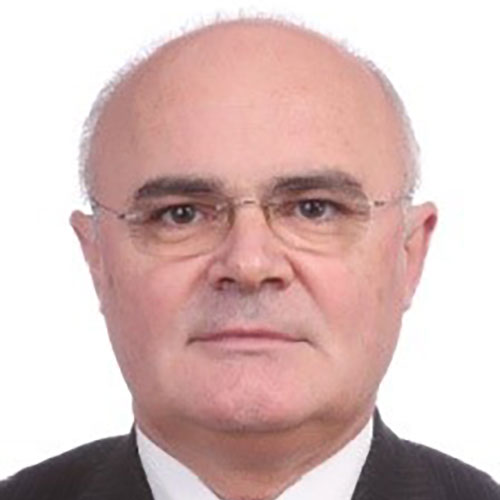
DORU COSTEA
He was Romania’s Ambassador to the State of Kuwait and the Sultanate of Oman (1991-1995), Egypt (1997-2001), UN and other international organizations in Geneva (2003-2009) and to China and Mongolia (2012-2017). While in Geneva, Costea was the second President of the UN Human Rights Council (2007-2008) – the first representative of a EU Member State in this position – and steered the setting up of HRC new mechanisms (the Universal Periodic Review, the Review of Mandates of Special Procedures and others).
Costea is fluent in Arabic, English and French and has a PhD in political science (2009) with the National School of Political and Administrative Studies, Bucharest, on democracy building in the Middle East. He lectured, inter alia, at the American University – Cairo, the Harriman Institute for Russian, Eurasian and Eastern European Studies at Columbia University – New York, Tsinghua University, the Institute for International Studies, the Chongyang Institute for Financial Studies with Renmin University, China Academy of Social Sciences in Beijing and at the Sun Yat-sen University, Guangzhou (Canton). He was a panelist at previous editions of the Bucharest Forum organized by the Aspen Institute Romania and the German Marshall Fund and speaker at meetings of the China Strategy Group with European Center on Foreign Relations.
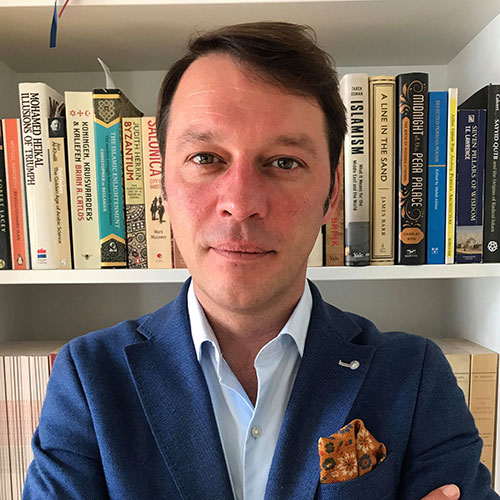
KOERT
DEBEUF
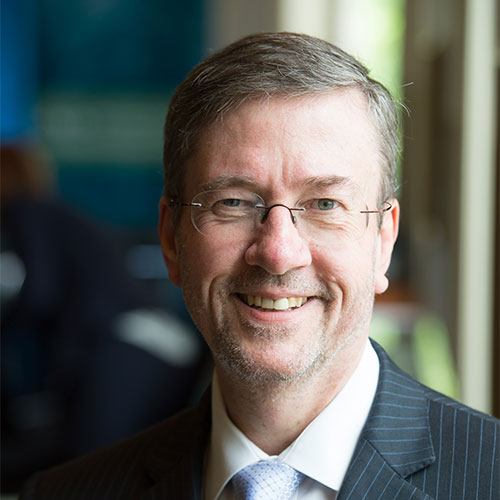
DANIEL HAMILTON
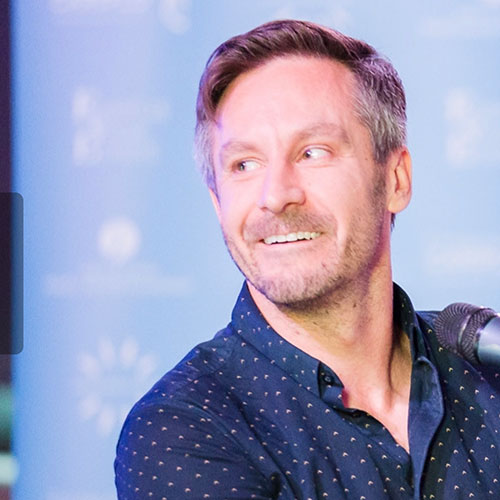
RYAN
HEATH
Ryan moderated the first presidential debate of the 2019 EU election, as part of a five year stint in the POLITICO’s European leadership team. Prior to POLITICO, Ryan wrote for the Sydney Morning Herald in Australia, and worked for the European Commission in Brussels as a presidential speechwriter and later as the Commission’s spokesperson for digital issues.
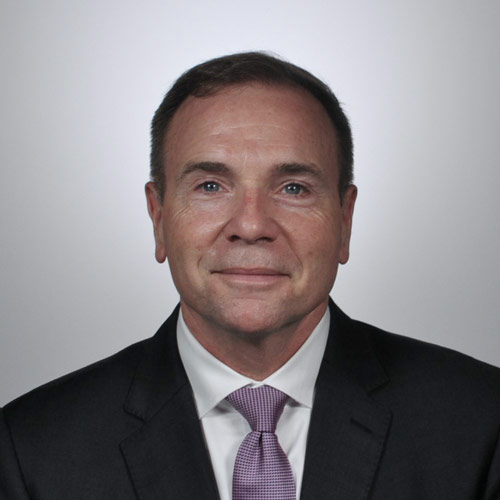
BEN HODGES
A native of Quincy, Florida, General Hodges graduated from the United States Military Academy in May 1980 and was commissioned in the Infantry.
After his first assignment as an Infantry Lieutenant in Garlstedt, Germany, he commanded Infantry units at the Company, Battalion, and Brigade levels in the 101st Airborne Division, including Command of the First Brigade Combat Team “Bastogne” of the 101st Airborne Division in Operation IRAQI FREEDOM (2003-2004). His other operational assignments include Chief of Operations for Multi-National Corps-Iraq in Operation IRAQI FREEDOM (2005-2006) and Director of Operations, Regional Command South in Kandahar, Afghanistan (2009-2010).
General Hodges has also served in a variety of Joint and Army Staff positions to include Tactics Instructor; Chief of Plans, 2nd Infantry Division in Korea; Aide-de-Camp to the Supreme Allied Commander Europe; Chief of Staff, XVIII Airborne Corps; Director of the Pakistan Afghanistan Coordination Cell on the Joint Staff; Chief of Legislative Liaison for the United States Army; and Commander, NATO Allied Land Command (İzmir, Turkey). His last military assignment was as Commanding General, United States Army Europe (Wiesbaden, Germany) from 2014 to 2017. He retired from the U.S. Army in January 2018.
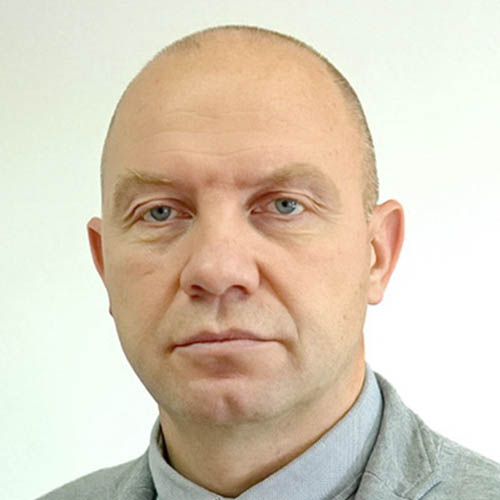
GORAN
ILIOSKI
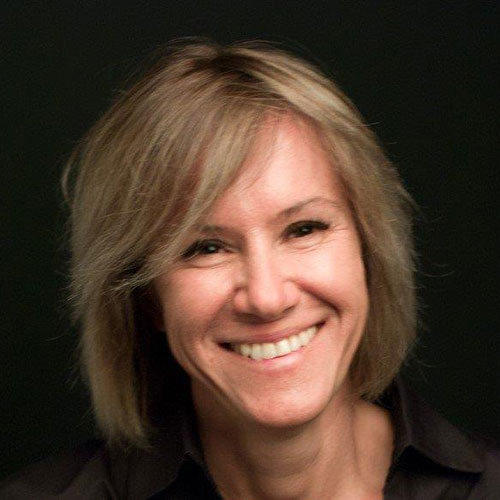
ALINA
INAYEH
Alina received her bachelor’s degree in geology from the University of Bucharest and a master’s in public policy from the Woodrow Wilson School at Princeton University.
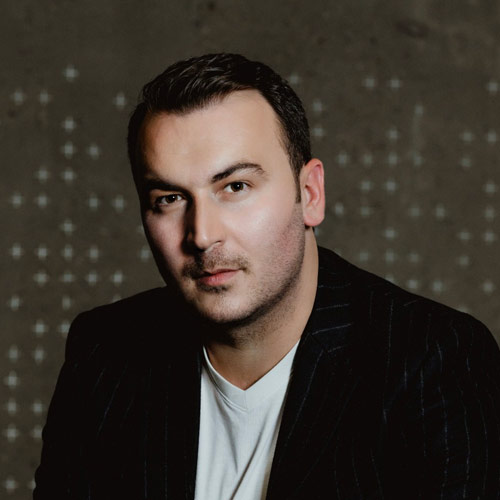
MIHAI IVAȘCU
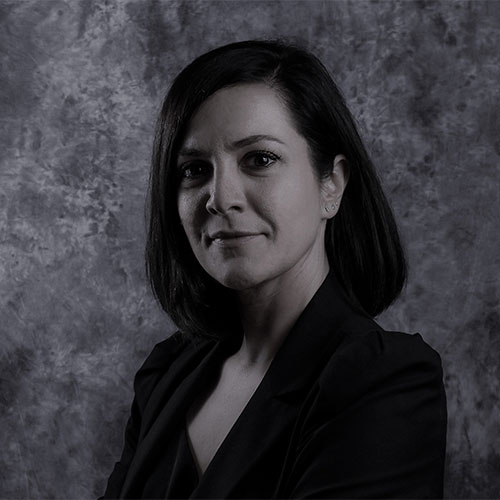
KLARA JORDAN
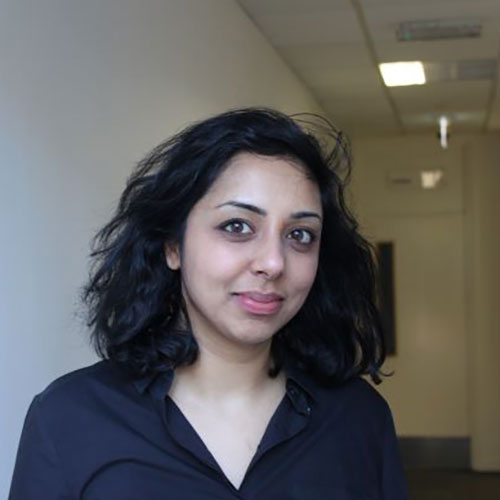
SHEETAL KUMAR
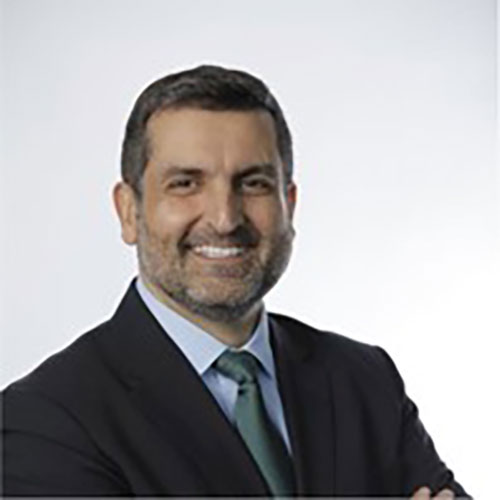
BOGDAN LĂZĂROAE
Bogdan was the Director of the NATO Headquarters Project Office and Transition Office, a role to which he was appointed by the NATO Secretary General. In this capacity, Bogdan lead the joint office responsible for the delivery of the new NATO HQ campus, a Euro 1.2 billion project, as well as the multiple transition projects necessary for the policy, procedural and operational transformation and physical relocation to the new headquarters environment. The decade-long project delivered a modern and highly secure campus housing 48 embedded national embassies and NATO civilian and military organizational entities totaling over 4,200 staff.
Bogdan also worked across multiple NATO HQ functions as the Enterprise Resource Planning (ERP) Project Manager, the Head of the NATO-wide Office of Shared Services and the Executive Officer for the NATO Executive Management Division.
Before joining NATO, Bogdan accumulated over a decade of experience consulting for public and private sector organizations in the United States of America on finance, tax and resource management, as well as business process improvement and systems implementation. He worked for the cities of New York, Houston, Dallas, Austin, Anaheim and Honolulu as well as the Commonwealths of Virginia and Kentucky.
Bogdan holds a Master of Business Administration degree from the Simon Graduate School of Business at University of Rochester and an engineering degree from the Polytechnic University Bucharest. In his spare time, Bogdan is an avid skier and golfer.
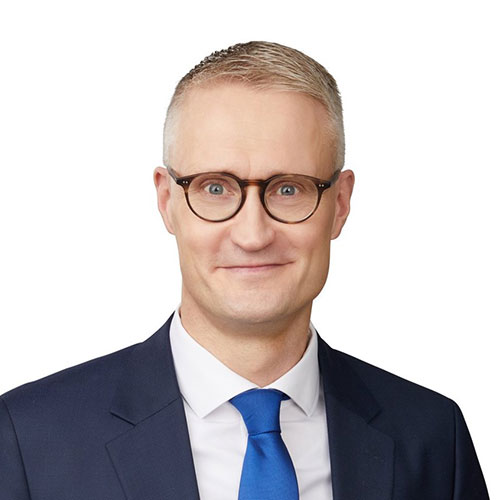
JARNO LIMNÉLL
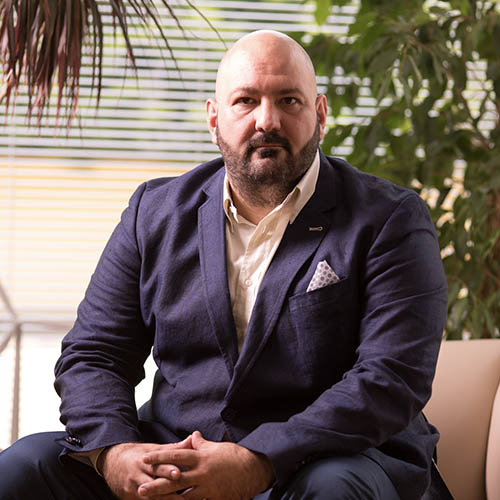
ALESSIO MENEGAZZO
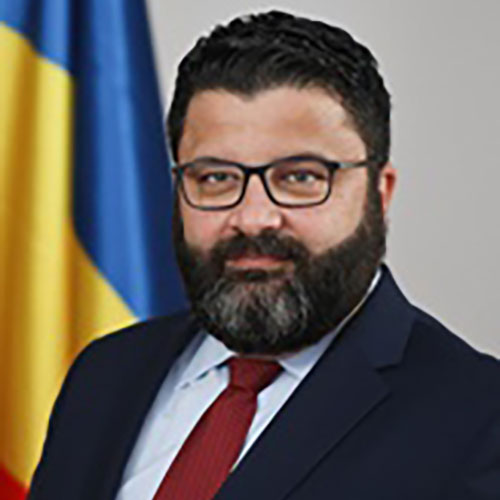
DAN NECULĂESCU
Between June 2016 and July 2017, he held important positions such as State Counselor for Foreign Affairs of the Romanian Prime Minister.
He is a career diplomat working in the Romanian Ministry of Foreign Affairs since October 2002, holding the diplomatic rank of Ambassador. During his diplomatic career, he fulfilled responsibilities in the Ministry of Foreign Affairs and in the diplomatic service abroad.
He held high-ranking positions in the Romanian MFA from which he contributed to the preparation for NATO Summits in the US (Chicago - 2012), UK (New Port - 2014), and Poland (Warsaw - 2016). He also contributed to the development of the strategic partnerships of Romania with the United States of America, Poland and Turkey, especially on the security dimension. In the period January - November 2013, he was responsible for the planning of monitoring activities in the headquarters in Tbilisi of the EU Monitoring Mission in Georgia (EUMM).
Between December 2006 and May 2009, he was Deputy Permanent Representative of Romania to the political-military dialogue in Vienna (Forum for Security Dialogue/FSC, Open Skies Consultative Commission, Common Consultative Group/JCG) and OSCE Security Committee, created in 2006.
From May 2009 to September 2011, he was Deputy Permanent Representative of Romania to the International Atomic Energy Agency (IAEA) in Vienna, and the Preparatory Commission of the Comprehensive Test Ban Nuclear Treaty (CTBTO). From this position he contributed to the preparation and carrying out Romania’s mandate as Vice-president of the IAEA Board of Governors (2009 - 2011), respectively Chair of the IAEA General Conference (September 2011). At the same time, he supported the fulfilling of Romania’s mandate as coordinator at the level of the Agency in Vienna for negotiations with IAEA Secretariat and member states on the IAEA budget for 2010 - 2011 and the IAEA Medium Term Strategy for 2012 - 2017.
Previously, between March 2004 and December 2006, he served as Head of office and subsequently Director of the OSCE, Nonproliferation and Arms Control Directorate of the Ministry of Foreign Affairs.
Between 2002 and 2004 he held several positions such as advisor to the Minister’s Cabinet and Third Secretary, then Second Secretary, within the Analysis and Policy Planning Directorate and NATO Directorate of the Ministry of Foreign Affairs.
He graduated from the Faculty of Political and Administrative Science of the University of Bucharest and the Faculty of Law of the University “Nicolae Titulescu” of Bucharest.
In addition, he graduated courses of the Diplomatic Academy of the Romanian Ministry of Foreign Affairs (2002), the Diplomatic Academy in the United Kingdom (2002) and NATO College in Rome (2003).
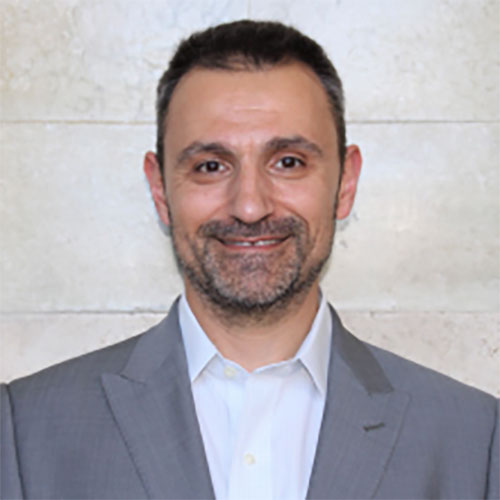
GIACOMO PERSI PAOLI
Giacomo’s areas of expertise include defence and security science and technology, innovation, emerging technologies, futures and foresight studies, and international security and disarmament.
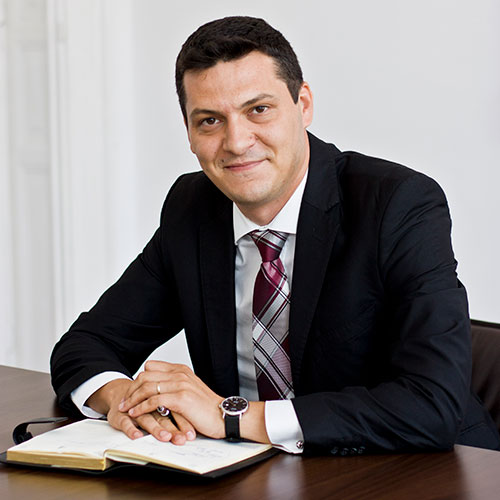
CRISTIAN PÎRVULESCU
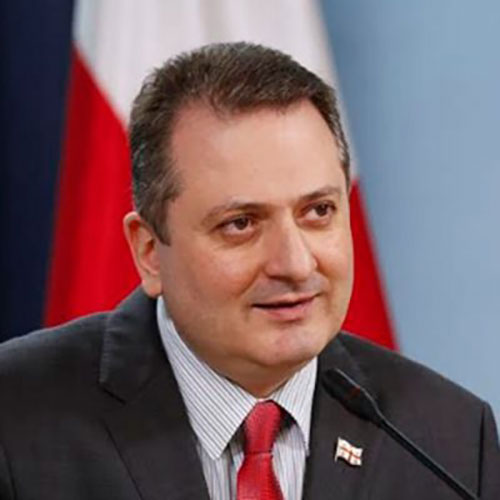
TENGIZ PKHALADZE
Between 1992 and 2004 he held various positions in Governmental sector and served as a Chief of Service of Diplomatic protocol of the Head of State of Georgia, Vice governor of the Mtskheta-Mtianeti region, Consul of Georgia to the Azerbaijan Republic, Deputy Director of the Department of Asia, Africa and Pacific Countries of the Ministry of Foreign Affairs of Georgia.
In 2008-2014, Tengiz Pkhaladze was the Chairmen of the International Centre for Geopolitical Studies. Numerous researches on National Security and Foreign Policy issues were conducted under his guidance and involvement. During this period, he also led the special training courses on national security for the Officers of the Ministry of Defense, the General Staff of Georgian Armed Forces and the Ministry of Internal Affairs.
Mr. Pkhaladze is the author, co-author and editor of several books and monographs about the Russian foreign policy, Georgian-Russian relations, Russian “Soft Power” towards the Eastern Partnership countries, international relations and security issues. He is also a member of the Royal Institute of International Affairs – Chatham House. He participated in numerous international forums and conferences related to the foreign policy and security issues..
Mr. Tengiz Pkhaladze graduated from Ivane Javakhishvili Tbilisi State University, faculty of International Law and since 2012 he is a Doctorate student at the Georgian Institute of Public Affairs.
He speaks English and Russian.
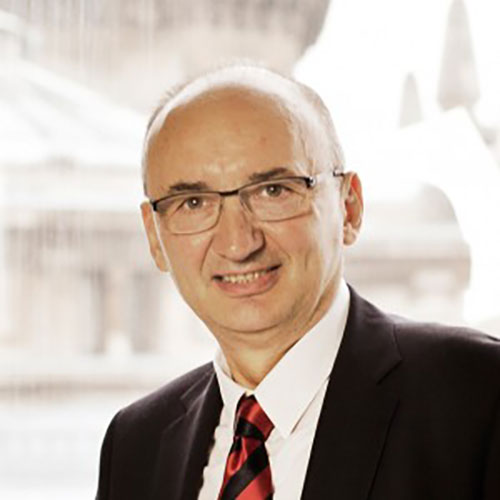
FLORIN POGONARU
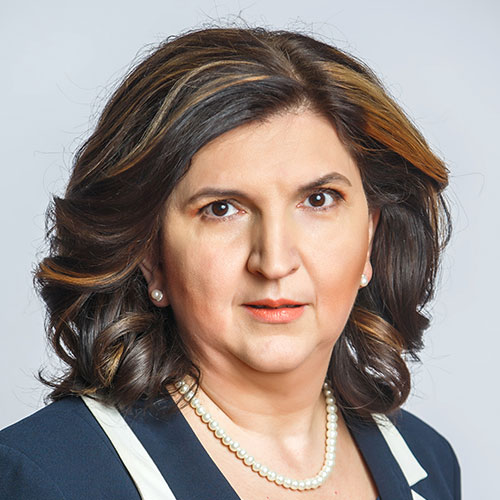
CORINA POPESCU
Starting with February 1, 2019, Corina Popescu holds the position of CEO of Electrica, for a period of 4 years.
Graduate of the Faculty of Power Engineering at the Polytechnic University of Bucharest, Power Engineering Systems department, Georgeta Corina Popescu started her professional career in Sucursala de Distributie si Furnizare a Energiei Electrice Bucuresti.
Since 2007, Georgeta Corina Popescu has worked in the private sector, helding important positions in E.ON Romania Group and OMV Group.
Between December 2015 and February 2017, Corina Popescu held the position of State Secretary within the Ministry of Energy, during which time she was also a member of the Board of Directors of Electrica SA. Starting with May 1, 2017, she was appointed in Transelectrica’s Directorate, and during the period of June 2017 – April 2018 she was Transelectrica’s Directorate Chairperson.

JAMIE SHEA
Prior to joining the University of Exeter, Jamie Shea was an international public servant and a member of the International Staff of NATO for 38 years. His last NATO post was Deputy Assistant Secretary General for Emerging Security Challenges. Other positions included Director of Policy Planning in the Private Office of the Secretary General, Deputy Assistant Secretary General for External Relations, Public Diplomacy Division, Director of Information and Press and Spokesman of NATO.
Outside NATO, Jamie Shea has been involved with several prominent academic institutions. For 20 years, he was Professor at the Collège of Europe, Bruges. He was also Visiting Lecturer in the Practice of Diplomacy, University of Sussex and Associate Professor of International Relations at the American University, Washington DC. Jamie Shea is a Senior Transatlantic Fellow of the German Marshall Fund of the United States and a Senior Fellow at the London School of Economics, where he teaches a course on crisis management and political communication.
Amongst his many associations and memberships, Jamie Shea is an Associate Fellow at Chatham House. He serves on the Board of the Danish Defence College, Copenhagen and is currently a Senior Advisor at the European Policy Centre and a Senior Fellow at Friends of Europe. These are two of the most active and influential policy think tanks in Brussels.
Jamie Shea has been awarded two honorary doctorates: one from the University of Surrey and the other from the National School of Public Administration in Bucharest, Romania. He is a recipient of the NATO medal for Meritorious Service.
In 2020, Jamie Shea was awarded the honour of Companion of St. Michael and St. George for services to NATO and diplomacy.
English mother tongue, in addition Jamie Shea speaks French, Italian and German fluently.
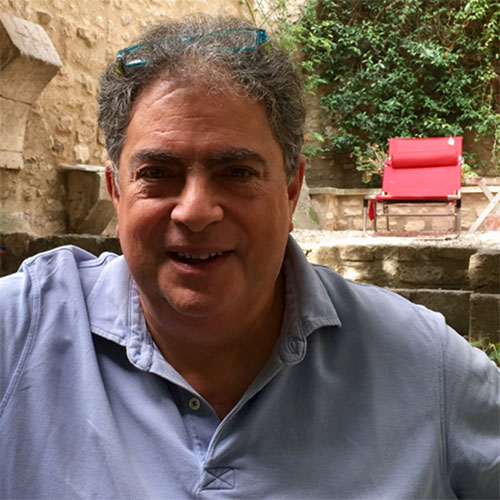
PAUL TAYLOR
He has published a series of reports on European defence and security issues for Friends of Europe since 2017, most recently Crossing the Wilderness - Europe and the Sahel (May 2021). He is now working on a study on the Black Sea and European security to be published in January 2022.
Taylor studied History and Modern Languages at Balliol College, Oxford, before joining Reuters as a graduate trainee in 1977. Over nearly four decades, he specialized in European politics and economics, defence and diplomacy, and the Middle East. He has worked in London, Paris, Tehran, Bonn, Brussels, Jerusalem, Berlin and Cairo. From 2008-16 he also wrote the “Inside Europe” column for the International New York Times.
A dual British and French citizen, he splits his time between Paris and Provence.
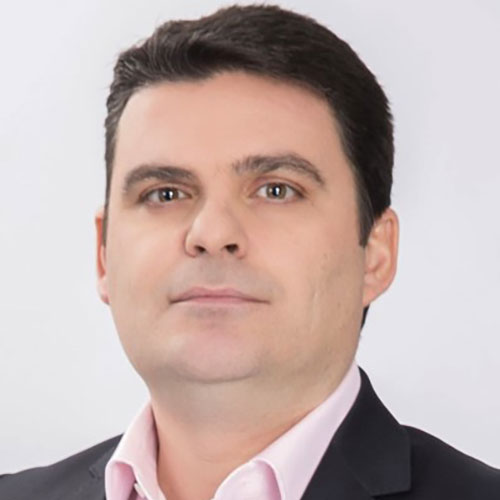
RADU TUDOR
Covering NATO Summits since 1994, moderator and invitee to several events on institutions, forums and NGO’s for defence, security, intelligence and foreign affairs : NATO, SHAPE, Aspen Institute, German Marshal Fund and others. Radu Tudor is the host of daily political show “Punctul de intalnire” at Antena 3 TV, the CNN partner in Romania.
Awarded in 2009, 2010, 2011, 2012 and 2014 and 2015 by Romanian Association of Professionals in Television (APTR).Since 2000, Radu Tudor is Jane’s Defence Weekly correspondent in Romania.
Radu Tudor is a graduate of the Higher School of Journalism, graduate in audio-visual media at Faculty of Journalism Bucharest, a graduate of National Defense College (1995) and the National Security College (2001). He has a Masters in National Security (2007) from the National Defense University “Carol I”.
Besides journalistic studies, Radu Tudor has a solid background on analysis on defense, intelligence, international relations. Quoted in articles and studies by US Atlantic Council, Rand Corporation, International Journal of Intelligence and Counterintelligence, Strategic Studies Institute – US Army War College, New York Times, BBC.
He’s the author of 4 books on defence, security, foreign affairs and politics.
You can also find his comments and analysis on www.radu-tudor.ro.
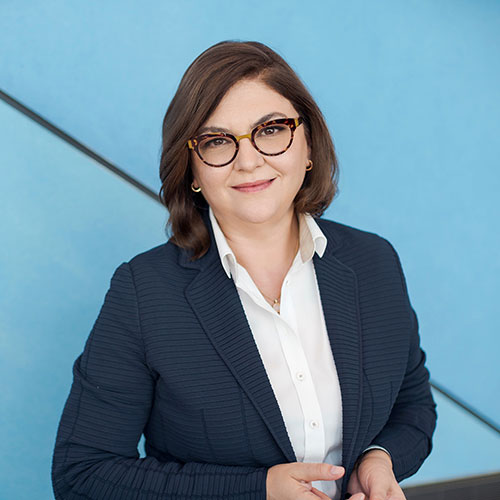
ADINA VĂLEAN
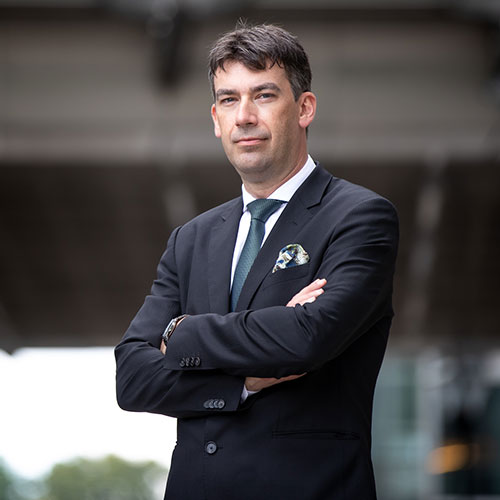
DRAGOS TUDORACHE
Dragos began his career in 1997 as judge at the Galati court. Between 2000 and 2005 he built and led the legal departments at the OSCE and UN missions in Kosovo. After working on justice and anticorruption at the Commission Representation in Romania, supporting the country’s EU ascension, he joined the Commission and, subsequently, qualified for leadership roles in EU institutions, managing a number of units and strategic projects such as the Schengen Information System, Visa Information System, and the establishment of eu-LISA.
During the migration crisis, he was entrusted with leading the coordination and strategy Unit in DG-Home, until he joined the Government led by Dacian Ciolos. Between 2015 and 2017, in Romania, he was Head of the Prime Minister’s Chancellery, Minister of Communications and for the Digital Society, and Minister of Interior. His current interests in the European Parliament include Artificial Intelligence and new technologies, the Republic of Moldova, internal affairs, security, and transatlantic issues.
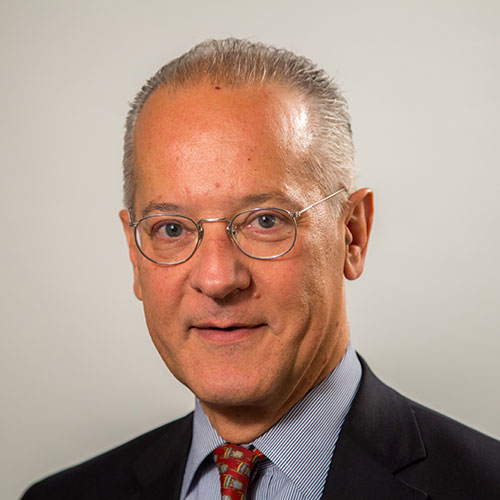
IVAN
VEJVODA
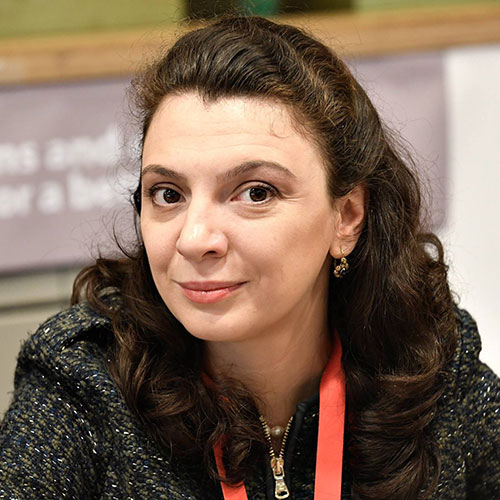
CLARA
VOLINTIRU
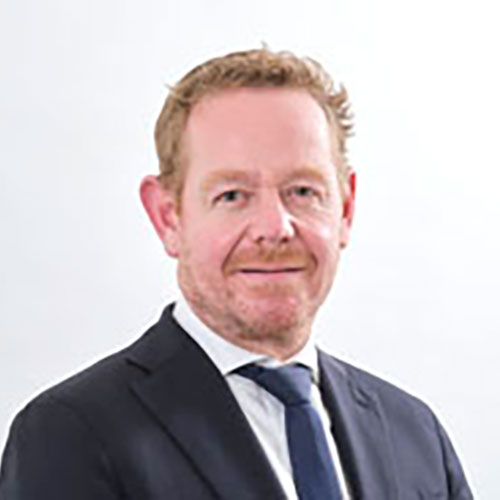
DAVID VAN WEEL
The Emerging Security Challenges Division, which he directs and manages, aims to provide a coordinated approach by the Alliance to all new and emerging challenges. These include cyber and hybrid threats, terrorism, as well as emerging and disruptive technologies (such as AI and quantum computing), energy security challenges, including those posed by environmental changes, and data policy. The division also runs the Science for Peace and Security Programme, which promotes dialogue and practical cooperation between NATO and partner nations through scientific research, technological innovation and knowledge exchange.
The Division aims to provide innovative policy solutions for countering and defending the Alliance and Allies against these challenges and to maintain the innovative and technological advantage of the Alliance in conjunction with partners, industry and other multilateral organisations.
Prior to joining NATO, David van Weel was the Foreign Policy and Defense Advisor for the Prime Minister of The Netherlands (2016-2020). This position followed a long career in The Netherlands Ministry of Defence, where he ended as Director for International Affairs and Operations/ Policy Director (2014-2016) after serving as the Chief of Cabinet for the Minister of Defence and the Permanent Secretary (2012-2014) and as the senior policy officer for amongst others operations in Afghanistan and Libya, NATO, nuclear policy and disarmament, special operations and the preparation of the Defence Budget.
David started his career in the Royal Netherlands Navy, where, upon completion of the Naval Academy (1994-1999), he served on different frigates, served in the British Royal Navy as an exchange officer, worked as a Staff Officer for Middle and Eastern European countries in the Defence Staff and ended as a Primary Warfare officer and Navigation Officer.
David is married to Iris and has two daughters, Felice and Alix.
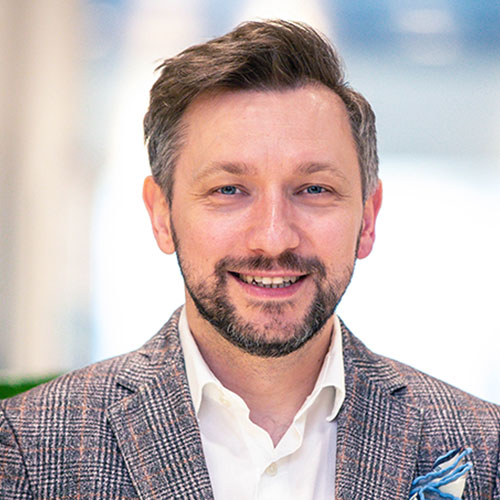
ANDREW WROBEL
ATLANTIC - BLACK SEA SECURITY FORUM
Our Partners
31 MAY - 2 JUNE, 2021 | BUCHAREST AND ONLINE


ATLANTIC - BLACK SEA SECURITY FORUM
Event Registration
31 MAY - 2 JUNE, 2021 | BUCHAREST AND ONLINE
Copyright 2021 The Aspen Institute Romania, All rights reserved

